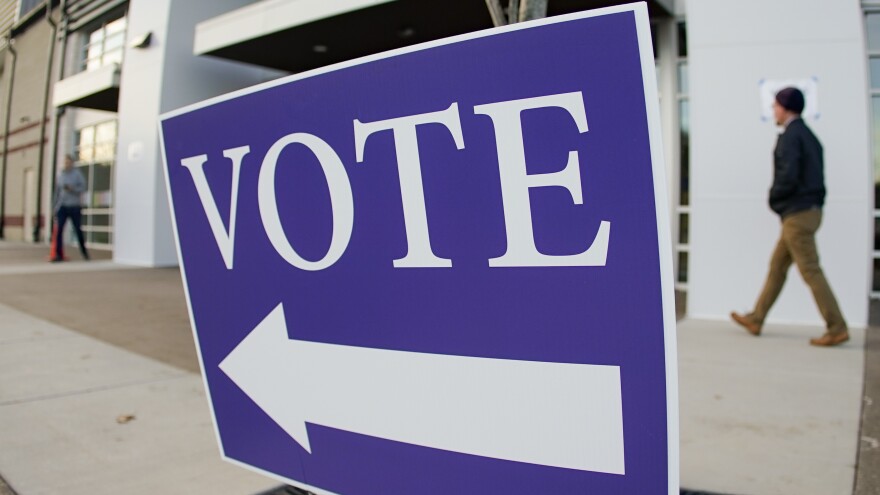BETHLEHEM, Pa. — Political hopefuls and their supporters lingered around televisions and continuously refreshed their web browsers late into the night Tuesday as they waited for Lehigh County election officials to upload poll results onto the county website.
But as the night dragged on, they discovered that much of the vote was already in.
While the last 50 or so precincts in the county — approximately one-third of the 161 in-person polling places — didn't get reported until after 11:30 p.m., it didn't contain as many votes as people may have expected.
Unofficial results show that Lehigh County election staff tallied 17,462 mail-in ballots Tuesday, meaning that more than 2 of every 5 votes cast in the primary arrived on a mail-in ballot. The lion's share of those ballots were tallied relatively early in the night, providing candidates trailing early fewer opportunities to make up ground.
While the turnout was in line with past municipal primaries — Northampton County's dipped as low as 12.5% in 2015 — it was behind what many political observers had anticipated. Locally, they're the lowest turnouts since mail-in ballots rolled out in 2020.
Christopher Borick, a political science professor at Muhlenberg College, initially thought that wider adoption of mail-in ballots would lead to more people participating than in the past.
After all, Lehigh County's 2023 municipal primary attracted 22.5% of eligible voters; still weak compared to a presidential year but a healthy margin above typical turnout.
"It's like the Charlie Brown thing where they pull the football out from under me."Christopher Borick, Muhlenberg College political science professor
Borick also believed the primary featured some compelling races on both sides of the aisle: countywide races for judge in both counties; high-profile mayoral races in the region's two biggest cities; a heated Democratic primary for Northampton County executive and a Republican primary for Lehigh County executive that focused in part on party purity.
But Tuesday's results suggest that the voter base in the local primaries hasn't extended much beyond party loyalists and super voters, he said.
What's changed is that more and more of that cohort are choosing voting at home at their convenience instead of during a designated 13-hour window on a regular workday.
Borick said his own idealism may have colored his thinking. Many cities and townships are dominated by a single party, meaning the primary can effectively decide the election. Broader voter participation would give residents more influence in how their communities are governed, he said.
"It's like the Charlie Brown thing where they pull the football out from under me," Borick said.
Waiting on the write-in count
Lehigh and Northampton counties post their election results through a browser tool hosted on their websites. While it's useful to get quick results and they've improved it over the years to spell out how many mail-in ballots have been tallied, it does leave some information out.
A key data point that's still up in the air? How many people wrote in a candidate in the Republican primary for Allentown mayor.
Ed Zucal lost to incumbent Matt Tuerk on the Democratic ballot, but Zucal launched a write-in campaign on the Republican side in the weeks before the primary. To advance as a Republican into November, he'll need at least 100 votes and be the top vote-getter.
The county's voting machines aren't capable of reading who those votes went to, but they should be able to count how many write-ins exist. That information was not on the county's election website Wednesday, and Chief Clerk of Elections Tim Benyo did not return an email requesting that information.
Zucal told LehighValleyNews.com that he requested the number of write-in votes in play for the GOP mayoral primary but was told that information won't be available for a few days. However, he was certain he cleared the hurdle to make it to November.
"I'm pretty confident I got that 100. I got it last time [in his city council race], and I wasn't even targeting it," he said.
Zucal acknowledged that he'll have his work cut out for him if he does advance. The city's registered voters are overwhelmingly Democratic, and Tuerk dominated the Democratic primary with 80% of the vote.
"I didn't think the numbers would be that far apart. It is what it is; I'm a big boy. I'll brush myself off and pick myself up," Zucal said.
A taxing election
Tuesday's primary nearly went off without a hitch. Nearly.
Lehigh County Executive Phil Armstrong confirmed Wednesday that Stacy Zellner initially appeared on the wrong ballot in the Catasauqua tax collector race, thanks to a series of mistakes by just about everyone involved.
Zellner, he said, erred by submitting petitions to run on both the Democratic and Republican ballots. While that's allowed in some races such as school board director and magisterial district judge, it's not allowed for tax collector. County workers realized the mistake only after it was sent to the printer, Armstrong said.
After consulting with Zellner, the county instructed the printer to take Zellner off the Republican ballot. However, the printer took her off the Democratic ballot by mistake, Armstrong said.
Zellner saw the botched ballot early Tuesday and alerted the county and state, Armstrong said. The county rushed correct ballots to the borough's three polling places later Tuesday morning, Armstrong said.
The county website reports Zellner won the uncontested Democratic primary and lists James Delbertis as the only candidate on the ballot in the Republican primary.


